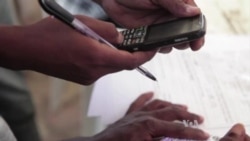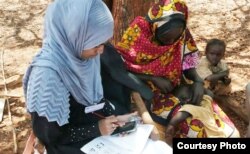According to the World Bank, 9 billion devices are connected to the internet today, but more than half of the world's population is still not connected.
Technologists and government officials say getting connected is critical to improving the lives of many people.
"We have got huge fights in terms of corruption, transparency, [and] openness, and technology is really the vehicle we're using to ensure that whatever transactions are taking place, you can see them. They're digital," said Joe Mucheru, Kenyan Cabinet secretary in the Ministry of Information, Communications and Technology.
But there are still areas of the world that are not connected, said Hilton Romanski, senior vice president and chief strategy officer of Cisco, a multinational technology company based in the U.S.
"Obviously, we look at Africa, we look at Southeast Asia — there are large swaths … of the population that are not connected," he said.
Denis O'Brien, chairman of the mobile phone company Digicel, says that once people start using smartphones, they talk less and use more data, making high-speed service or broadband a necessity.
He said that building the infrastructure in developing regions is a challenge, pointing out, "Everybody's built the easy bit. In other words, they've done the towns and the cities, but going into rural communities — they haven't done it because the business case is very thin."
Technology experts said the private and public sectors need to come together to bring the internet to remote and developing regions, and drive economic growth.
"Any country that wants to create investment and be a location for investment to create employment, the first thing you need is broadband," O'Brien said.
Is technology the answer?
Kentaro Toyama, associate professor of community information at the University of Michigan, has a warning for developing nations that see technology as the solution for economic growth. He notes that social problems did not end in the U.S. as digital innovation advanced over the last 45 years.
"During that same span of time, this country has experienced rising inequality,” he said. “The medium income has declined."
Toyama added that in developing nations, a smartphone alone will not help people who are uneducated and lack technological skills — "people, for example, who are physical laborers on farms, where it doesn't make too much of a difference if you can have access to the latest agronomic research paper as a way to improve your farming."
But O'Brien said the opposite is true.
"Once you get broadband, you can educate people,” he said. “You can create jobs for people, and people from an agricultural point of view become much more efficient."
He also pointed to cultural differences in each country.
Giving the Kenyan point of view, Mucheru said, "The internet is going to make a change. It is critical for people. I think the fact that maybe some of the people in the West haven't come out of poverty because they have not used their devices well is not the same for Africa."
Cisco's Romanski said it takes cooperation among private, government and nonprofit sectors to maximize the impact of technology.
"So it's going to take all the parties coming together to drive the right cultural shift and the right education into these countries so that the developing market can, over the long term, enjoy the benefits of economic growth," he said.
The experts agreed that positive change in a nation can happen if education about technology is combined with the right policies.







